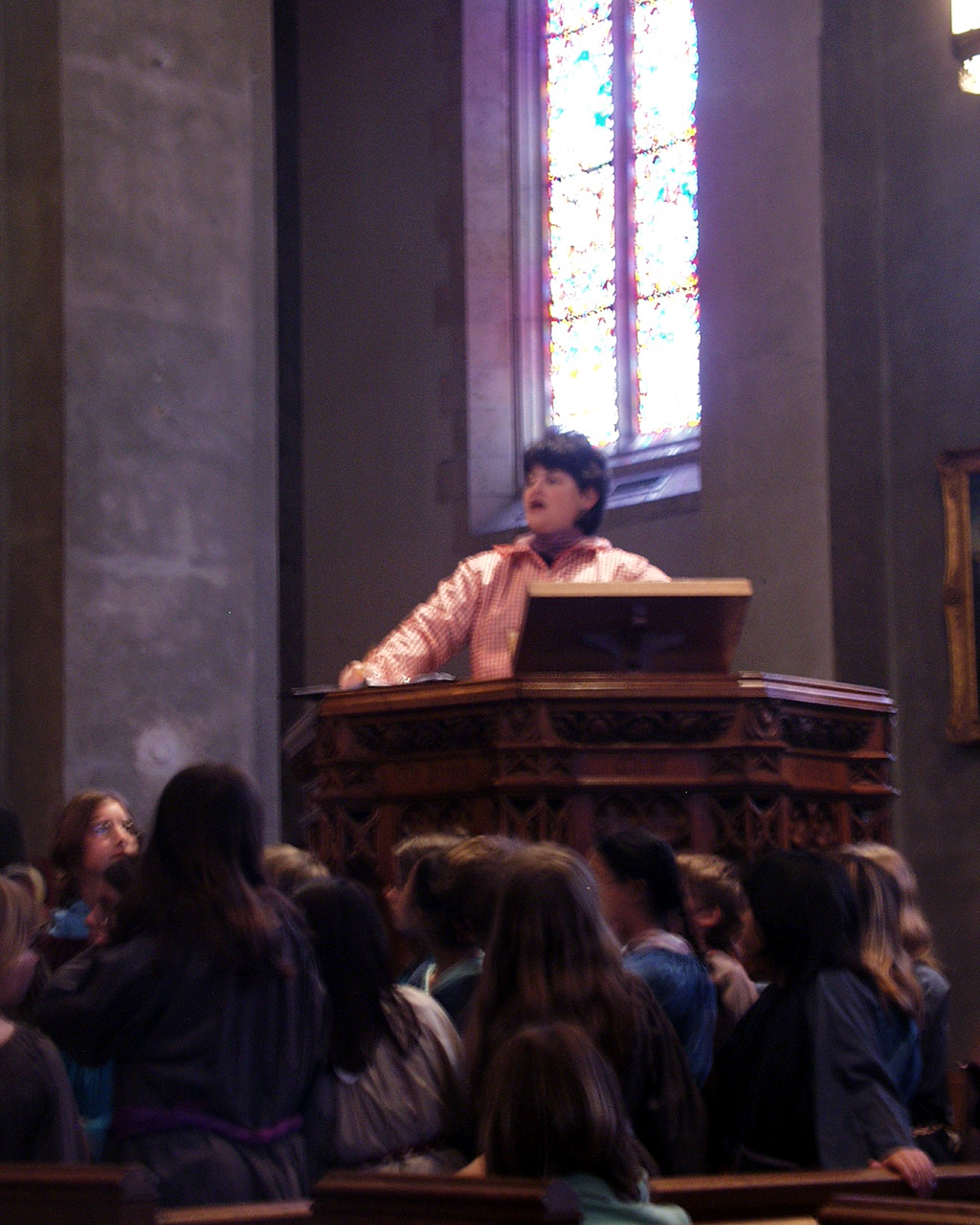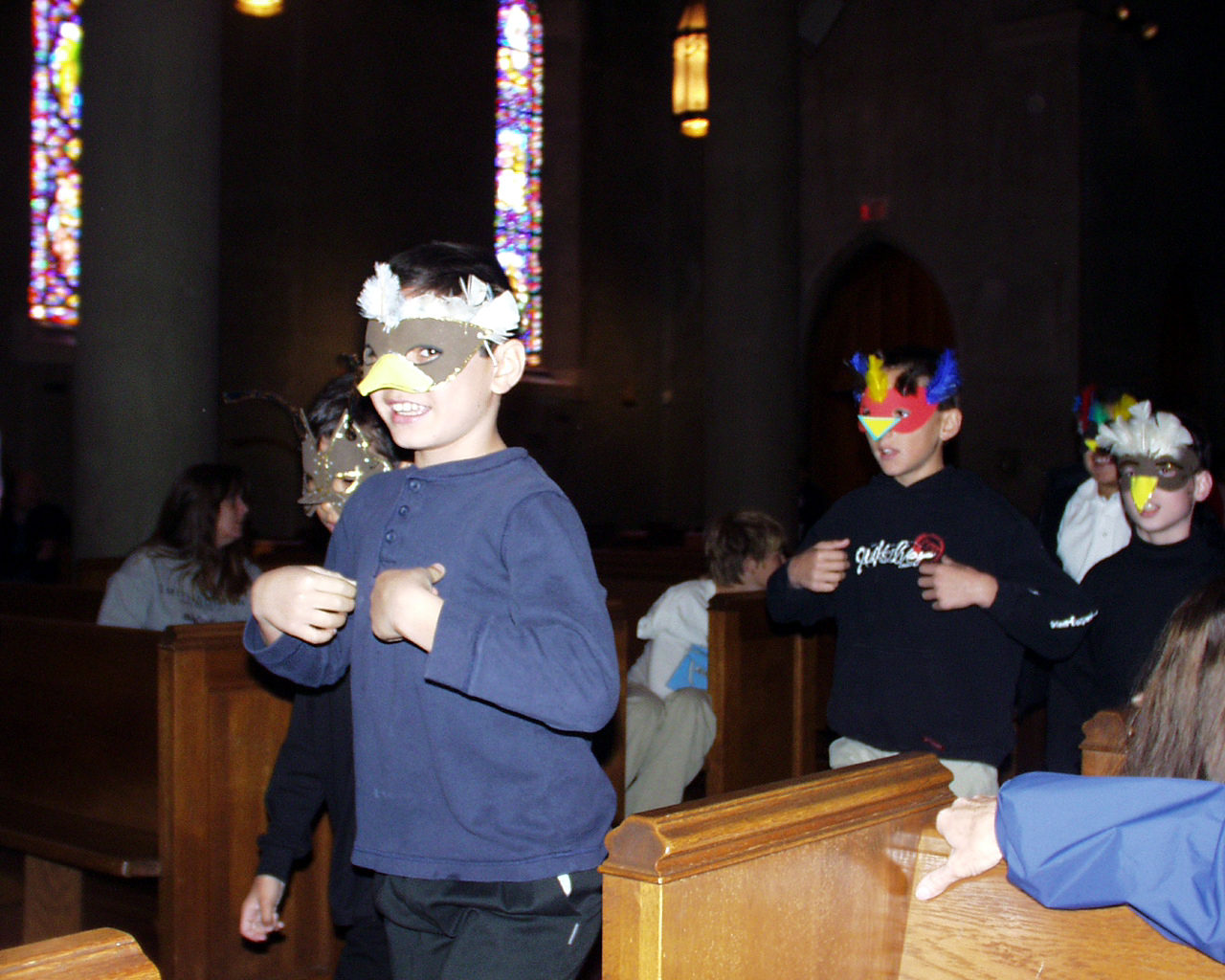|
By Donald H. Harrison
SAN DIEGO— Appropriately enough, it was raining this morning as grandson
Shor and I dressed and got ready to drive to St. Paul's Cathedral to watch
a rehearsal of Noye's Fludde. When the phone rang, Shor's
mommy, Sandi
Masori, wasn't calling only to ascertain how much he had enjoyed
the sleepover. She also had important news. "Quick, look to the
west," she urged. "There's a rainbow!" However, by
the time we got on our shoes and went out in the yard, the colorful archway had
vanished. That was a disappointment because a rainbow would have been a perfect
prelude to watching Noye's Fludde—which is how you say, "Noah's
Flood," in 15th century English.
The San Diego Children's Choir in association with the Pacific Academy of
Ecclesiastical Music and St. Paul's Cathedral will perform the "church
opera" twice next weekend, at 7:30 p.m., Friday, March 24, and at 3 p.m,
Saturday, March 25, inside the Episcopal cathedral located at the corner of
Fifth and Nutmeg Streets. If you feel a little funny about going to church
on Shabbat, think of it the way I explained to 5-year-old Shor. "This
opera is like a rabbi telling a story about a passage in the Torah—only set to
music" in this case composed by Benjamin Britten for the centuries-old Chester Miracle
Play.
Previously, I had spoken by telephone with the
conductor of St. Paul's Cathedral, Stephen Sturk, who also is the founding
director of Pacific Academy of Ecclesiastical Music, to find out whether the
opera closely followed Torah or whether it was christological—that is, whether
it used Hebrew Scriptures to try to indicate that the coming of Jesus had been
foretold.
Sturk responded that there were some occasional references to Jesus
contained in the score—obviously anachronistic because Noah had preceded Jesus
by so many centuries. However, he said, it is unlikely that members of the
audience would even notice them, so quickly do they go by. Now having
heard the production, I would have to agree with Sturk As the lyrics of
the choral music are in an archaic form of English, they are somewhat hard to
understand. The acoustics of the cathedral make it even harder.
However, one doesn't really need words to enjoy the story that
unfolds all around you as this church opera proceeds. From behind a
pillar, we hear the deep booming voice of God recounting His displeasure with
the world He created, and telling Noah (Christopher Stevens) to build an ark. Then the townspeople—children wearing biblical robes—enter from
the back of the sanctuary, led by "Mrs. Noah," of all people! In
this midrash, Mrs. Noah (Ava Baker Liss), like the rest of the
townspeople, doubts Noah's sanity. She doesn't want to get on the ark with all
those animals; she'd rather remain ashore gossiping with her friends. She'd have
perished with them too had not Noah's three sons physically transported her into
the ark.

"Is that true?" Shor wanted to know. "Didn't Mrs. Noah want
to go?" I explained that such information does not appear in the
Torah, so like the rabbinical tales, or midrashim, this was a story
trying to fill in some of the gaps in the Bible. I thought I had survived
that round of his questioning pretty well, but during a short break in the
rehearsal while Sturk gave some instructions to members of the orchestra,
Shor became fascinated by some of the cathedral's stained glass windows.
Who were these people in the windows? he wanted to know. I responded that
they were people who appear in Christian Scriptures.
"They believe Jesus was the Son of God, but we Jews don't," Shor
informed me. "Who is right?"
Gulp. Did I have to give an answer right away?
Here? Now? "We all are children of God," I responded.
"We
Ava Baker Liss rehearsing as Mrs. Noah
don't all believe the same things about God, but we all seek to be
close to Him," I said. "I don't think God cares how we believe;
I think He cares about how we act, how we behave towards each other. So
it's important for us—even as we try to be good Jews—to respect the
religions of other people too."
Momentarily, that seemed to satisfy Shor, and
luckily the action was picking up again. Now down the center aisle, the
animals two by two were coming, portrayed by masked members of the San Diego
Children's Choir, who flapped their arms, chirped, and sang to music showcasing
the talents of the orchestra's brass and percussion sections. The
children, ranging in age from six through their teens, were adorable.

Into the ark they went, and next came a musical interlude of hymns helping to
fill the 40 days and 40 nights that Noah and passengers shared the ark.
Members of the audience will be invited to sing the hymns along with the
choir—so not only will they be watching the spectacle, those who choose to do
so will be participating in it. My assumption is that most Jews who attend
will be satisfied to simply listen.
As the biblical story goes, when the flood waters began to subside, Noah first
sent out a raven and later a dove, the latter of which returned with an olive
branch in its beak. After the ark sets down safely on Mount Ararat, the
children—er, animals—disperse. And God sends His rainbow as a sign that
he'll never cover the entire earth again with a fludde.
Shor knows the story of Noah
very well, considering the biblical arkmaster almost as "cool" as
"Curious George" or the
comic-book Batman, his current number-one Superhero.
I had a surprise for my grandson. I pointed to Ava Baker Liss, the
big-voiced Mrs. Noah. "She's Jewish," I told him.
"Like us?" he asked. "Yes, and she likes to sing religious
music, whether in synagogue or churches."
In fact, Liss, a regular singer with the San Diego Opera, had served for a
period as a cantorial soloist at Congregation Beth Israel, and more recently had
performed "Voices of Shechina" with the Tifereth Israel
Community Orchestra at our own synagogue. She describes her husband, 6'
9" Ira B. Liss, as "the tallest Jew in San Diego."
Ava Baker Liss also sings at a Christian Science Church and serves as a soloist
at the First Unitarian Church. She said because of her close
association with the Unitarian Church, which stresses the unity of all
religions, she thinks of herself as a "Jew-nitarian."
"A lot of things I sing have nothing to do with Judaism,
but my purpose as a singer is of a spiritual nature, where I can feed the souls
of people who come to worship," Liss had told me. She also said,
"I believe in past lives, and in one past life, I was a gospel singer in
the South. The kind of music I have a deep connection to is Negro
spirituals."
Liss had grown up near Baltimore at Chizuk Amuno, which she described to me as a
"reconformodox congregation." She said her family, like the rest of the
community, loved to attend Yom Kippur services conducted by Rabbi Louis Kaplan,
the late president of the Baltimore Hebrew College. "He used to give these
forums on Yom Kippur and the forums were things that packed the synagogue to the
rafters. He was a very forward thinker."
Shor hung back when I tried to introduce him to the opera singer during a
10-minute break in the rehearsal, why, I, uh, don't Noah.
"I'm shy until I get to know someone," he explained to me later.
Perhaps meeting someone portraying a person from the Bible— especially in this
huge cathedral, amid an orchestra, choir and many costumed children— was
somewhat overwhelming. However, during the car ride home, Shor announced
that he had liked the opera and hopes he'll get to see it sometime straight
through, without interruptions.
Children under the age of 17 will be admitted to next weekend's
performances for free, while tickets for adults costs $15. Further
information may be obtained at (619) 298-6759.
|

